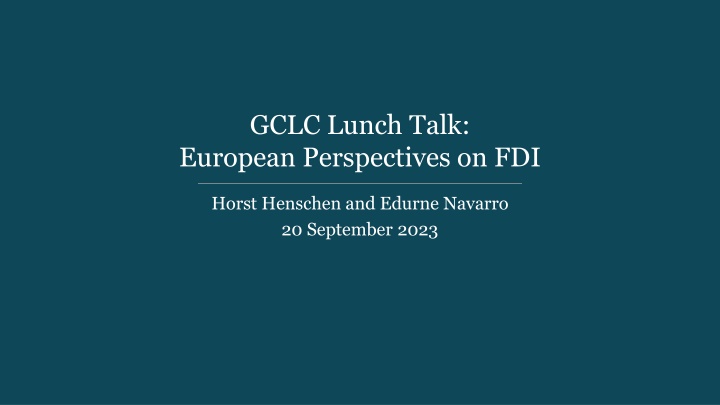
European Perspectives on FDI Landscape and Regulations
Explore the diverse landscape of Foreign Direct Investment (FDI) in Europe, with insights on screening mechanisms, multijurisdictional complexities, and increased regulatory complexities in countries like France, Italy, and the UK. Learn about the German trends in FDI screening and notable interventions in sensitive sectors. Stay informed about the evolving FDI regulations shaping the business environment in Europe.
Download Presentation

Please find below an Image/Link to download the presentation.
The content on the website is provided AS IS for your information and personal use only. It may not be sold, licensed, or shared on other websites without obtaining consent from the author. If you encounter any issues during the download, it is possible that the publisher has removed the file from their server.
You are allowed to download the files provided on this website for personal or commercial use, subject to the condition that they are used lawfully. All files are the property of their respective owners.
The content on the website is provided AS IS for your information and personal use only. It may not be sold, licensed, or shared on other websites without obtaining consent from the author.
E N D
Presentation Transcript
GCLC Lunch Talk: European Perspectives on FDI Horst Henschen and Edurne Navarro 20 September 2023
Heterogeneous FDI landscape With the recent addition of Belgium, the Netherlands and Luxembourg, 21 of the 27 EU Member States have a screening mechanism in place. National regimes are very heterogeneous both in terms of process and substantive assessment. UKwith a very active Non-EU regime.
FDI Multijurisdictional Complexities Filing obligations and gun-jumping risks Significant standstill obligations Applies to all foreign investors Very low filing thresholds Complex FDI filing assessment Different definitions of foreign typically, all investors from non-EU countries are foreign Other concepts: - Non-EEA / -EFTA / -OECD - All non-national or simply all investors incl. nationals) Indirect acquisitions are typically caught even if made through European affiliates FDI filing assessment is much more qualitative than for merger control Required information often not contained in data room Legal uncertainty whether or not to file, as the assessment is still not mature - Consequence: Frequent voluntary or precautionary filings to get legal certainty Acquisition of 10% (or even less) of voting or capital rights may trigger a filing obligation Asset deals usually captured but different concepts No or only de-minimis transaction value thresholds Call-in powers in some MS even for non-sensitive activities Most EU regimes with mandatory filing requirements Gun-jumping rules trigger waiting periods for approval decisions (suspension effect) Time periods vary among European countries e.g., 30 business days (France) or up to 3 months (Spain since 1 September 2023) Frequent: Stop-the-clock mechanisms Country-by-country assessment necessary 3
Increased Complexity: France, Italy & UK France: 24 sensitive sectors In 2022 the MINEFI reviewed: 325 notifications 131 of them were eligible for FDI control (~40%) 70 Conditional authorizations (~53%) Italy: 10 sensitive sectors In 2022 the Italian government reviewed: 608 notifications 294 of them were eligible for FDI control (~48%). 23 Conditional authorizations (~8%) UK: Relatively new regime 17 sensitive sectors From 1 April 2022 - 31 March 2023 the Investment Security Unit (ISU) reviewed: 766 notifications 65 Cases in Phase 2 (8,5%) Intervened 15 times (~2%), blocking or unwinding 5 transactions
German Trends Over the last five years, the number of screening cases has almost quadrupled 27 sensitive sectors (plus defense) In 2022, 306 investments were notified to the BMWK (same number as in 2021) Approximately 90% of notifications are cleared within 2 months and without conditions Known interventions by the German government mainly concerned Chinese or Russian investments Interventions covered sectors such as semiconductors, port infrastructure (COSCO / Hamburg container terminal), satellite technology, health (respiratory machines) In semiconductors, Taiwanese GlobalWafers failed in its acquisition of Siltronic after more than a year of proceedings due to the absence of a German FDI decision before the deal s long-stop date In September 2023, Germany prohibited the acquisition of a 45% share-package in Kleo Connect (German satellite data communication start-up), despite the fact that the Chinese acquiror Shanghai Spacecom Satellite Technology (SSST) already owned 53% of the shares But Chinese investments do not necessarily reach Phase 2 BMWK is very conscious that for an intervention to be justified, there must be a potential harm to national security (i.e. in line with the ECJ s Xella -Judgement and previous case-law) For example, acquisition of high-tech supplier to ( sacrosanct ) car industry even if known for production and IP transfer to China is not a concern per se: at least as long as the knowledge is already available in China and remains available in Germany because there are still other providers in the German market
German Trends - Eckpunktepapier New BMWK position paper( Eckpunktepapier ) sets out plans to significantly tighten FDI review Position paper only reflects BMWK s views no coordination beyond this ministry for this paper All proposals are discussion points the Eckpunktepapier is not a draft bill Lower Thresholds ? Discussion of filing requirements for sensitive greenfield investments (high-tech sectors) Taking into account of "de facto" presences in shareholder meetings to calculate percentage thresholds for notifications Extension of atypical control acquisition (mere rights could be sufficient no acquisition of shares required; could become a mandatory filing requirement this is currently only required in the wider defense sector) Evaluation of extension of FDI screening to critical cooperation in academic research Evaluation of the definitions of the 27 sensitive sectors Introduction of a legal presumption of a likely effect on national security for some sectors such as quantum technology, semiconductor, AI (= change in the burden of proof) Outbound investment is excluded from this scope; dealt with at EU level Possible introduction of a provision allowing for information exchange with non-EU states to cooperate on specific matters (based on a waiver of the parties)
Spanish Trends Considerable amount of filings. Wide scope of application (difference with Portugal). In 2022 the Spanish regulator reviewed: 98 notifications, 27% more than previous year. of the 73 cases formally screened, 86% cleared unconditionally, 12% cleared conditionally and 1% prohibited (concerning Russian investor). Focus on sectors such as energy, telecom, pharma, but also AI, data, semiconductors. Experience has allowed recent review and simplification, in force since 1 September 2023. 1. Timing: reduced from 6 to 3 months (RFIs suspend deadline). 2. Exemptions: New system of exemptions according to sector of activity. Exemptions from defense control for investments that do not reach 5% of companies and, subject to certain conditions when they reach between 5% and 10%. 3. Interpretation: sets out interpretative criteria already applied by the authority. 4. Authority: Council of Ministers or General Directorate for International Trade and Investments are competent depending on the amount of the investment. CAUTION! Transactions raise alarm when made public (Telef nica/Saudi investors)
EU Coordination Mechanism Wish list (Part 1) EU FDI Reg. to facilitate alignment of national legislative processes and coordinated application. Cooperation mechanism has worked well, allowed discovering non notified transactions. But still major differences between national regimes inefficient, time-consuming and unpredictable. Different jurisdictions often have different priorities and areas of political sensitiveness. These issues should be addressed. Aim at a streamlined system, as in merger control: 1. Simplification focus on transactions that require in-depth analysis. Easier to achieve once regimes have more experience identifying problematic cases. Examples of simplification recently in Spain and last year in Italy. EU 2021 only 7% of cases with commitments (although in France 53%!) and 1% prohibited. 2. Coherence despite national specificities and interests, the system would benefit from increased alignment among Member States. Also in relation to treatment of investments from EU.
EU Coordination Mechanism Wish list (Part 2) 3. Transparency visibility on process within the regulator and factors considered for final decision. Publishing more reasoned decisions to be used as precedent and provide understanding of key issues. Confidentiality: to be solved through redaction (~ merger control). 4. Coordination outside the EU significant disparities on scope of FDI screening mechanisms. Contacts: EU-US and UK to harmonize investment screening in security risks, i.e. China technology. Cooperation system with non EU-States as in Germany (with waivers). Further coordination in the future? Agreement of list of welcome and unwelcome investors, most concerning industries or potentially common rules.






